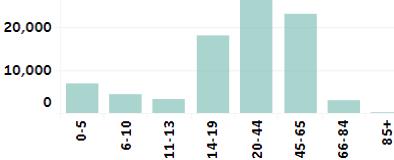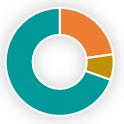





Since 2009, Los Angeles Unified School District has strategically invested a portion of school construction bond funds to build 16 full-service medical clinics on school campuses known as ‘Wellness Centers’. These Wellness Centers are located in the highest need areas of Los Angeles and are open to students, their families, and community members –regardless of their ability to pay.
As a long-standing partner of Los Angeles Unified School District, The Los Angeles Trust for Children’s Health (The L.A. Trust) was enlisted by the District to recruit and support nonprofit health care companies to run the Wellness Centers and to ensure student health needs are being met.

Since 2016, The L.A. Trust has independently raised over $1.5 million for the development of the Data xChange. The Data xChange is a HIPAA and FERPA compliant database and centralized reporting environment that quantifies the impact of the Wellness Centers, improves resource allocation for LAUSD, and supports research that answers questions about the connections between student health and academic achievement.
The Data xChange is the only known database in the country to integrate student health data with academic data such as attendance, grades, and graduation rates. It was designed to be interoperable with other systems and it seamlessly integrates with different electronic health systems at the click of three buttons. The Data xChange only reports out ‘aggregated insights’ and therefore no identification of an individual’s health or academic results is possible.
In support of the Data xChange, The L.A. Trust regularly hosts a county-wide Data xChange Expert Advisory Council made up of partners who share in our mission such as: Community Clinic Association of LA County, Inner City Struggle, Community Coalition, Prevention Institute, The Children’s Health Partnership, and First 5 LA. Representatives also attend from LAUSD Student Health & Human Services, LAUSD Office of Data & Accountability, and interested insurers such as L.A. Care and Kaiser Permanente. This council guides our health reporting and cultivates a better understanding of our data and insights so that these partners and advocates can better support LAUSD students and families.
The Data xChange is a forward-thinking solution that takes school modernization and student well-being beyond brick and mortar improvements. By using data and technology to proactively focus on the human side of health and learning, The L.A. Trust helps LAUSD make the most of their investments and puts the District in a leadership position in the arena of school-based health care.

While 2020 has been challenging on many fronts, the Covid-19 pandemic has spotlighted the exceptional ability of LAUSD Wellness Centers to serve those most at risk during this crisis.

Operating at only half capacity from March to June, our Wellness Centers received over 12,000 visits from predominantly Latinx and Black patients in marginalized neighborhoods where health and social inequities have put them at disproportionately greater risk.
Standing by communities and students in the highest need areas of Los Angeles is exactly what LAUSD Wellness Centers were designed to do –and through our work on The L.A. Trust Data xChange, I’m pleased to share insights in this report that point to the enormous impact these Wellness Centers have had over the past 5 years.
Since 2015, just 11 Wellness Centers alone have received more than 225,000 visits from over 85,000 patients and almost 50% of all patients have received a comprehensive Well Child Exam.
When we compare our results to other similar school-based health entities we find our Wellness Centers see a staggering number of visits and patients for so few clinics. (There are more details about this in the Demand for Services section of this report and I hope you’ll have a look.)
Since 2016, The L.A. Trust has independently raised over $1.5 million for the development of the Data xChange to quantify the impact of Wellness Center investments; to improve the allocation of health resources; and to answer questions about connections between student health and academic achievement – and we plan to keep the momentum going.
As we respond to funding changes for 2021, we are staying focused on improving deep-dive Covid reporting; integrating with Welligent and other systems to gain insight into 34 additional SBHCs along with school nurse visits and school mental health services; and putting data-driven action plans in place with Wellness Centers to improve quality of care.
Ensuring the Data xChange is financially sustainable in the long-run remains a high priority for The L.A. Trust and as such we continue exploring funding and partners who share our values and commitment to measurement and evidence-based practices in the arena of school-based health.
The L.A. Trust is a long-standing partner of the District and we want LAUSD to be a shining example of how kids can thrive when their health is tended to and we work tirelessly to this end.
While the slogan may say that “as California goes, so goes the nation,” in our world we know that “as LAUSD school-based healthcare goes, so go the nation’s children.” So, here’s to using our size and leadership to set an example for California and the nation.
Sincerely,
Maryjane Puffer Executive Director The Los Angeles Trust for Children’s Health
School-based Wellness Centers across Los Angeles Unified School District have proven to be a crucial element of overall population health as the Covid-19 pandemic has taken the lives of more than 4,400 Angelenos.

Tackling approximately 54,000 visits from 23,000 unduplicated student and community patients this past school year, the 11 Wellness Centers that participate in The Los Angeles Trust for Children’s Health Data xChange have significant reach into communities that need health services now more than ever.
The coronavirus has spotlighted the exceptional ability of our Wellness Centers to serve those most at risk during this crisis. Despite school closings and stay-athome orders, 6 Wellness Centers remained open during the height of the lockdown. From March to June alone, our Wellness Centers saw over 12,000 visits from predominantly Latinx and Black patients in marginalized neighborhoods where health and social inequities have put them at disproportionately greater risk.
As many of our Wellness Centers pivot toward tele-health and incorporate more specific coding practices related to Covid-19, The Los Angeles Trust for Children’s Health Data xChange will stay in step with them by working to create new reports and insights on telehealth visits and coronavirus statistics.
As the Los Angeles Unified School District moves toward online learning for the 2020 – 2021 school year, it is the goal of our Wellness Centers to remain open and to continue to provide services to the students, families, and community members most in need across Los Angeles.
Wellness Centers are full-service medical clinics located on school campuses in the highest need areas of LAUSD. Founded on the principle that children are only as healthy as the environments they live in, Wellness Centers were specifically designed to serve not just students, but their families and community members, too.
Over the past five years, Wellness Centers have received 229,205 visits from 86,262 unique patients. On average, patients visit 3x per year which indicates they have a recurrent relationship with the Wellness Centers and consider these clinics a trusted source of care.
229,205 Visits
86,262 Patients
143% Growth IN VISITS OVER PAST 5 YEARS

2.7 AVERAGE NUMBER OF VISITS (PER PATIENT PER YEAR)
68,761 STUDENT VISITS (6 – 19 YEARS OLD)


The percent of Latinx patients visiting Wellness Centers has decreased from 72% in 2017 to 57% in 2020.
Over the same period there was an increase in Other/ Unreported from 6% to 17%.

Wellness Centers provide intergenerational care to families and community members.
More females visit the Wellness Centers compared to males. However, among student-aged patients (6-19 years old) the proportion of males increases slightly to 42%.


All Wellness Centers provide physical and mental health services. 4 Wellness Centers provide dental services.
The percentage of Mental Health visits will increase significantly when LAUSD School Mental Health Services data is integrated into the Data xChange in 2021.




(AGES 6-19 YEARS)
Services provided to students tend to focus on prevention while services provided to adults focus slightly more on managing chronic diseases. It is worth noting, however, the high ranking of Well Child Exams among students and community members. Upon a closer look, we found that almost 50% of all patients receive a comprehensive Well Child Exam.

Establishing healthy behaviors as children is easier and more effective than changing behaviors as adults. Wellness Centers play an important role in promoting the health of young people so that positive lifelong behaviors can be established early on, and in turn, reduce the risk of chronic disease later in life.

In order to understand the full impact of SBHCs across all of LAUSD, the integration of Welligent and other health systems is planned for 2021. Once this is complete, we will have a complete picture of the SBHC limpact in LAUSD.
There are 50 School-based Health Centers Across LAUSD 50 34 16
34 SBHCS ARE NOT DESIGNATED AS WELLNESS CENTERS AND THEY SERVE MOSTLY STUDENTS
THESE SBHCS USE WELLIGENT & OTHER EMRS WHICH WE AIM TO INTEGRATE IN 2021
WELLIGENT DATA INCLUDES SCHOOL NURSE RECORDS AND SCHOOL MENTAL HEALTH SERVICES

EFFORTS IN 2021 ALSO INCLUDE INTEGRATION WITH SCHOOL-BASED WELL-BEING CENTERS OPERATED BY PLANNED PARENTHOOD
16 ARE DESIGNATED WELLNESS CENTERS THAT ARE STAND-ALONE, FULL-SERVICE MEDICAL CENTERS
11 OF 16 WELLNESS CENTERS CURRENTLY PARTICPATE IN THE DATA XCHANGE
13 OF 16 WELLNESS CENTERS WILL PARTICPATE BY OCTOBER 2020
3 OF 16 WELLNESS CENTERS ARE NOT PARTICPATING IN THE DATA XCHANGE. SHHS IS WORKING TO MAKE PARTICIPATION MANDATORY.
SBHCs are effective because they put health care where students already spend most of their time – at school. They provide:
• Enhanced access to health care by bringing it directly to where students and families are and conducting active school-based outreach to connect students with care.
• Stronger prevention and population health by connecting clinical care with public health approaches such as group and classroom education, school wide screenings and prevention programs, or efforts to address the social determinants of health.
• Intensive support for the highest need students by being present on a daily basis to manage chronic disease, address behavioral health issues, deal with crises, and help students and families access resources.
• Support for the school’s mission to improve academic achievement by working together to address absenteeism, school climate, and classroom behavior and performance.
Research has shown, and teachers and educators intuitively know, that healthier children are better students because they are able to focus in class and are not distracted by hunger, pain, stress, or a chronic illness.
LAUSD SCHOOLS WITH WELLNESS CENTERS
Belmont*
Carson Crenshaw
David Starr Jordan
Elizabeth Learning Center
Fremont
Gage Middle School*
Garfield
Hollywood Jefferson
Locke Early Education
Maclay
Manual Arts
Monroe*
Investments in Wellness Centers and The L.A. Trust Data xChange support the Whole School, Whole Community, Whole Child Model of health (WSCC) put forth by the Center for Disease Control.
The WSCC framework is student-centered and emphasizes the role of the community in supporting the school, the connections between health and academic achievement and the importance of evidence-based school policies and practices.
Excerpted Material:
California School-based Health Alliance: https://www.schoolhealthcenters.org/school-health-centers-in-ca Centers for Disease Control and Prevention: https://www.cdc.gov/healthyschools/wscc/index.htm
Santee
Washington Prep
* Indicates not currently participating in the Data xChange
For more information about this report please contact Maryjane Puffer at maryjane@thelatrust.org

